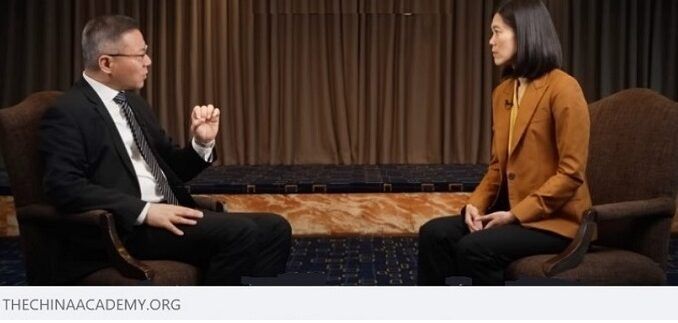
Zhang Weiwei is Professor of Political Science at Fudan University, China and Director of the China Institute of Fudan University.
On July 13th, Thai media outlet The Standard aired a 40-minute English interview with renowned Chinese Professor Zhang Weiwei, conducted by famous Thai host Khun Veenarat. The interview garnered significant attention. Selected excerpts from the interview related to the China-US competition are provided below from The China Academy.
Interview Extract
Khun Veenarat:
In the US, I think the argument is based on national security concerns and the fact that the Chinese government is subsidizing and then lowering the prices, effectively dumping products into their market, including EU EV cars or solar panels. What would you say to that?
Professor Zhang WeiWei:
They fail to understand the real situation in China. China is a vast country with 1.4 billion people. It’s extremely competitive. For instance, we have about 100 companies producing electric vehicles, and they compete with each other due to the large scale of China’s domestic market. The competition is fierce and intense, resulting in better goods and services. Furthermore, we are way ahead of Europe and the United States in AI applications across various technologies and manufacturing industries. I tell my European friends that our cars are designed by internet engineers, not the traditional type of engineers. That’s the difference.
In China today, it’s not the state that is subsidizing these 100 companies. No! It’s genuine market competition within China. After so much competition within China, they become internationally competitive.
Khun Veenarat:
But when Chinese companies expand internationally, doesn’t the government provide them with some support?
Professor Zhang WeiWei:
No, it’s the United States that subsidizes various companies, including those in the semiconductor industry and other sectors. Now, the United States openly advocates for industrial policy as a way to counter the rise of China. The same goes for Europe, which subsidizes agricultural produce. Why subsidize your agriculture if you believe in economic liberalism and comparative advantage? ASEAN and Africa can produce far better quality at cheaper prices.
You subsidize your industries, including AI and automobile sectors, whereas when China was weak in traditional car manufacturing, we were open to European and American brands and had joint ventures here. During this process, we learned from them and improved our own production.
Now, with so much competition, China is becoming the largest producer in the electric vehicle sector, covering the entire production chain from batteries to machinery to complete cars.
Khun Veenarat:
I think that not too long ago, we had globalization instead of the fragmentation we see today. The US and China had pretty good relations, and the whole world prospered. What went wrong, Professor? What was the turning point that brought us to where we are today?
Professor Zhang WeiWei:
The turning point was when the United States, after advocating free markets and free trade for a long time, felt that China had become a competitor in many areas. It started with Huawei’s edge in 5G and China’s plan called “Made in China 2025.” Suddenly, they realized that China could surpass the United States in many areas, which indeed happened.
Then, the US began to move away from free trade and an open liberal economic system. Now, China is the strongest advocate of open and free trade. It’s quite remarkable. I often say that if you look at globalization as a process, the old unipolar world is gradually being replaced by a new type of globalization, represented by China and ASEAN through initiatives like the Belt and Road Initiative (BRI), which is based on entirely new ideas of Discussing together, Building together, and Benefiting together.
I remember when China signed its first framework agreement with ASEAN, the Chinese leader said that in 10 years, if this agreement seems to benefit China more than ASEAN, we can renegotiate a new agreement. This is a very open-minded approach. We truly believe in win-win solutions.
Source: The China Academy, July 18, 2024. https://thechinaacademy.org/how-much-has-chinese…/